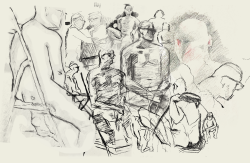You’re not much of a bleeder,” Alicia Nelson (COL ’08) remarks, efficiently administering a finger prick to her bemused and tearful patient.
The young woman on the receiving end of the test sniffles a little, not sure how to handle this bit of news in light of the fact that her shirt is spotted with crimson droplets.
It’s Saturday night, we’re in the back of an ambulance, and though I feel for this girl, I figure Alicia knows a bleeder when she sees one. A senior and president of the Georgetown Emergency Response Medical Service—commonly known by the ironic acronym “GERMS”— Nelson has been on over 300 emergency calls and has seen a lot worse than tonight’s moderate sanguinary showing.
“Some of my scariest calls have been behavioral emergencies,” she tells me, going on to describe a patient whose altered mental state rendered him unaware of his surroundings. He reverted to a traumatic childhood experience and became violent with the GERMS attempting to help him.
“The most scared I’ve been on a call,” pipes in Nathan Srinivas (SFS ’09), currently driving the ambulance, “was with an elderly woman with spiking blood pressure and a falling oxygen level.”


Talk turns to drug overdose calls. People snorting Oxycotin, Xanex, chasing sleeping pills with Jack Daniels, even one heroin-use call that Nathan seems pretty excited to relate.
And then, of course, there are the suicide attempts.
“Tylenol is the most dangerous over-the-counter drug,” Alicia tells me. Nathan agrees, and says that he has even stopped buying it. I make a mental note to clean out my medicine cabinet.
In twelve hours with this GERMS night-shift team—made up of Sarah Cronin (NHS ’09) and Josh Cohen (COL ’10) in addition to Nelson and Srinivas—conversations often morph into narratives of the calls they’ve gotten during their time as EMTs. But for all the glamour of saving lives, much of being a GERM is the inevitable and interminable periods of boredom and waiting. No wonder they watch so much “COPS.”
7:45 p.m.
The first thing I notice in the GERMS office, located next to the Village C lounge, is that everything and everyone is blue. About six people fill the space—some lounging on chairs, others bustling around, all wearing the familiar uniform of navy-blue polo shirts and cargo pants. The walls are painted hospital blue and even the couches and bunk-bed coverlets in the inner room are variations on the same dull color. They’re not here to decorate, which is reassuring in a way.
Instead, the walls are plastered with bulletin boards displaying statistics, driver charts and pictures of the newest GERMS (called “probies” because they are still on probation before becoming full-fledged members) in relaxation mode. Apparently, GERMS like to party too.
I will be joining a standard four-person team on the twelve-hour night shift, 8am to 8pm. On average, newer GERMS tend to work one shift a week, while drivers and those in the administration work two to three times during a seven-day period.
After signing forms assuring that I will not release any specifics of the incidents I witness (like names, locations and details of injuries) and that GERMS will not be held responsible if I am hurt during the course of the night, I settle in for what I hope will be an eventful evening.
Alicia tells me that at this time last year, which happens to be the first Saturday with the new freshmen on campus, GERMS had seven calls. They aren’t expecting that many tonight because of rain and the heat lightning that illuminates the sky like a laser show. She says that the first few weekends of school are always a bit of a “shit-show,” with first years learning how to drink and making a lot of mistakes along the way.
I hope that they don’t disappoint.
8:00 p.m.
Nathan and I are on Harbin 2, getting ready to talk to the freshman floor about GERMS. During this first week of school, the organization is trying to educate new students about their services, and most importantly, give out their phone number (202-687-HELP). Coincidentally, Nathan’s girlfriend and fellow GERM is the RA on this floor.
Nervous laughter and Madras shorts abound as residents file into the common room. It’s pretty much the same deal on every floor we visit: homemade brownies are ubiquitous, as are ice-breaker games. One girl shares her contortionist abilities with the rest of the floor. Some guy in the back asks for her room number.
8:30 p.m.
Back in the office, Chinese food is the order of the day, with Sarah vacillating for fifteen minutes about whether or not she should get the cashew chicken. Split-second decisions are apparently reserved for emergency situations.
Everyone is sitting around the table, looking at papers or talking to the off-duty GERMS who have come to visit. Josh is explaining to whoever will listen how the number of calls they get is directly correlated to the lunar cycle.
“It’s not just that I ride more on full moons,” he says, going onto the computer to look up statistics. “It’s a percentage thing.”
Alicia is on the phone with someone, delegating and directing, “He can become 81 once you get to the ambulance.”
I pretty much understand nothing of what is said once the GERMS get on their walkie-talkies or phones. I ask them to explain the lingo, which they do so by talking more about 80’s and 81’s, rambling on with various other numbers. I eventually gather that these numbers refer to the GERMS on the crew; each has a designated numeral. Mostly I just nod as they throw out their technical terms. There’s a reason why you have to take a 120 hour class to get this job.


I ask them if they think they should get paid for their services, because from my outsider’s perspective, this is a whole lot of work for no pay and minimal respect.
“I would quit GERMS if it paid,” Nathan says definitively.
Everyone else seems to agree, and says that the volunteerism aspect of their job makes it special. Of the professional EMTs he has seen in action, Nathan says they seem “disaffected by their job.”
With the food ordered, it’s time to check on the ambulance outside. On the way out, someone asks whether we’ll be busy tonight.
“We won’t be,” Josh says with authority. “It’s waxing gibbous.”
8:55 p.m.
“Wanna pass me that jump pack?”
Alicia is directing “rig check,” which involves a lot of scrambling around the back of the ambulance making sure things are working and in the right place. The stretcher is pretty much the only spot to sit and not be in the way, but I decide that would be tempting fate. I move to the front seat where air conditioning and rap are blaring.
Musical selections are made by the driver, and Nathan tells me that techno is a popular choice.
“It goes well with the sirens.”
Whatever gets them through the night.
10:30 p.m.
With their hunger sated, it’s TV time. “COPS” and “Futurama” are the programs of choice, and the blare of the tube is interrupted by conversations that could be happening anywhere on Georgetown’s campus right now. At least most of them.
Josh tells me about his idea to start a Georgetown SWAT team called the “G-Unit” that would carry bear mace. It’s apparently stronger than the regular variety.
Alicia is talking about the different reasons people do GERMS, and surprisingly, not everyone in the group is dead-set on becoming a doctor. She says that they prefer to have students who are not pre-med, because GERMS is meant to be more than just a resume-builder. They view it as a critical service to the Georgetown community.
For those aspiring doctors who do join the group, working as an EMT is an every-day embodiment of the ideals important to professional healers.
“Some of my friends say it helps them through Orgo [organic chemistry] and reminds them why they’re there,” she says.
10:50 p.m.
Nate and Josh are discussing the merits of becoming an army medic.
“It’s the definition of cool,” Josh effuses. “You have a gun and you get the best injuries.” After a pause and a glance in my direction, he adds, “And you get to save people.”
Nate echos his sentiments and I recall his response to my earlier question about why he joined GERMS.
“It seemed like the most bad-ass activity here.”
12:30 a.m.
The GERMS have decided to turn in for the night, and as a guest, I have been given the top bunk to sleep in. I leave my shoes and notebook at the foot of my bed, ready to be accessed at a moment’s notice. I feel like a fireman, minus the bulging muscles and years of training.


1:00 a.m.
“Everybody up!”
There is really no need for this directive, as the whole room has already sprung into action, awakened by the earsplitting tones emanating from various radios.
The crew is half-way out the door as I jump off the bed, managing to grab a raincoat with “GERMS” emblazoned on the back—my effort to blend in with the crowd.
We walk-run to where the ambulance is waiting underneath Village C, hop in and Nathan brings the $130,000 vehicle to life, sirens blaring and music up. We get a few cheers from bystanders. I try not to grin with excitement—after all, this is an emergency—but I am beginning to grasp the allure of this job, and Nate’s “bad-ass” summation appears pretty accurate.
1:05 a.m.
Josh and Sarah are taking the vital signs of a patient who has sustained minor injuries unrelated to alcohol. This is pretty standard for a GERMS call; only 7 percent of the incidents the group responds to involve intoxication.
A DPS officer and I stand by and watch as the crew snaps into efficiency mode, evenly questioning their charge as they apply bandages, prepare a cold pack and usher her into the ambulance.
My admiration for the crew’s ability to calm their patient grows once we reach the emergency room and are confronted with a doctor. Humorless and birdlike in his movements, the M.D. barely looks his patient in the eye and makes her nervous with his visible irritation at the fact that she can’t remember the date of her last tetanus shot. I resist the urge to crack a joke about Jello shots and remain fairly certain that no one besides hypochondriacs and new mothers remember immunization dates.
The doctor reaffirms my negative assessment of his people skills when he doesn’t even recognize Alicia, who works as an ER technician in the hospital. He covers his tracks by saying she looks different in scrubs. Funny, the nurse who chats familiarly with her for a few minutes doesn’t seem to think so.
Back in the ambulance outside the ER, I ask Nate why there were so many D.C. firemen lounging around inside. He explains that they like to take as long as they can at the hospital because once they radio back into base, they have to take other calls. Nate says that there are a lot of professionals in the business he has seen who lack a certain enthusiasm for their jobs.
“I saw attitudes we wouldn’t tolerate in GERMS.”
2:00 a.m.
We are back in the office winding down from the adrenaline of the call when the crackle of the radio splits the air, and the voice of a DPS officer informs the crew that there is an intox incident.
Back to the Bat-Mobile.
We fly down the street, only to be hailed by a DPS car and told that the individual under surveillance has fled. The officer tells us to “canvass the area” for the suspect, which Nate does by leisurely driving around the block, telling me that if someone is running away from DPS, they really don’t need help from GERMS. The crew members are not DPS lackeys, and they are loath to get a fellow student into disciplinary trouble.
2:20 a.m.
I am back in my top-bunk perch, staring at the Village C ceiling five inches from my nose. My shoes and notebook have been neatly replaced in their ready position and I drift off to sleep, with visions of splints and suturing dancing through my dreams.
8:09 a.m.
“Shut the door!” Sarah yells from her resting place on the couch, before turning over and drifting back to sleep.
I check my watch and realize my stint as an honorary GERM has been over for nine minutes, and now I feel like Cinderella in her rags at the ball; woefully out of place.
The outer room is filled with a new crew, who survey me with some skepticism as I meekly say hello, before grabbing my things and heading out into the muggy morning air.
Trudging up the New South hill, I see the ambulance, standing in ready solitude as the first drops of a looming rainstorm begin to fall. Oh, to ride once again, sirens blaring, gears humming. And preferably not in the back.




